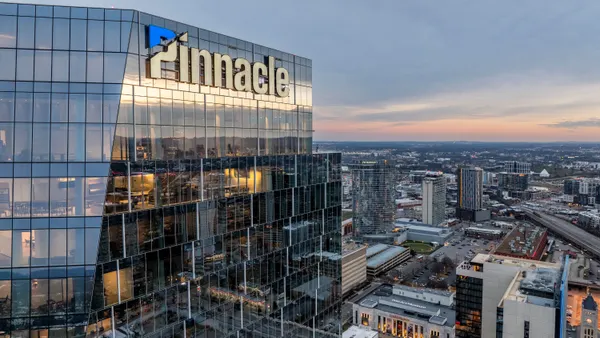If you've ever gone all-in on an unknown quantity, you've been in Kabbage's shoes. The fintech had never processed a loan for the Small Business Administration (SBA) before the Paycheck Protection Program (PPP) launched in early April.
Yet the company went so far as to pause lending altogether in late March — without notifying some of its small-business clients — so it could "restructure [its] systems and teams to prepare" to participate in the program, CEO Rob Frohwein wrote in a blog post five days later.
The move risked alienating customers. Employees, too: The company furloughed a "significant number" in the run-up to PPP.
But the gamble paid off. Kabbage would process over 297,000 PPP loans — more than any lender except Bank of America. And 97% of its PPP borrowers were new customers, the company said in July.
However, although banks saw unprecedented demand from the start of PPP, fintechs were left largely on the sidelines in the program's initial days as the SBA wrote and rewrote guidance on eligibility, giving some nonbank lenders a case of white knuckles.
"I don't think there was a point where we weren't worried," said Kabbage co-founder Kathryn Petralia, "between the guidance [and] the question of ‘Can we be a direct lender?'"
American Express, unlike the SBA, was a known quantity in Kabbage circles. Executives were friendly with one another and shared an admiration.
"We'd been following Kabbage for about five years and were extremely impressed with what they've done in terms of small-business strategy: They were expanding beyond lending," said Gina Taylor Cotter, senior vice president and general manager of global business financing at American Express.
Kabbage announced in July it would offer small-business-geared checking accounts, in partnership with Green Dot, that feature a 1.1% annual percentage yield paid out monthly.
"We've had lending for a really long time — that's the product that we launched with in 2009 — and we added payment acceptance last year along with [Kabbage] Insights, which helps our customers analyze and predict cash flow," Petralia said in July. "Checking is the glue that holds all of that together."
Kabbage continued to innovate within lending, too. The company announced in February it would roll out custom small-business loans that could be repaid in as few as three days. It also launched a streamlined PPP application aimed at self-employed independent contractors — specifically, Uber drivers and delivery folks.
The concept of going beyond a previous business model was familiar to AmEx. Although best known for its plastic payment vehicle, American Express and other payment networks have focused in recent years on going "beyond the card."
To that end, each of the three largest card networks in 2020 announced the intention to make acquisitions reportedly worth nine figures or more.
Visa struck first in January, saying it would buy data aggregator Plaid for $5.3 billion. The Justice Department (DOJ) sued to block that transaction in November, claiming the deal would limit competition by neutralizing what the agency said Visa saw as a nascent threat. Visa has since fired back in a court filing, saying, "Plaintiff's narrative ... is nothing more than a patchwork of excerpted party documents and testimony taken out of context."
Mastercard followed in June, similarly joining forces with a data aggregator — Finicity — in an $825 million deal the DOJ approved in November.
American Express took its own path, aiming not for a data specialist per se but a small-business savant. The company said in August it would acquire Kabbage's team, its full suite of fintech products, its data platform and its internet protocol for small businesses. Neither company would disclose the purchase price, but Barron's put the tag between $750 million and $1 billion.
AmEx has played the pursuer before. In one of its longer-running, better-publicized business goals — regarding card acceptance — it chased its competitors before signaling this year that it had caught up.
However, in this case, Taylor Cotter said AmEx felt no particular pressure to close a deal this year simply because Visa and Mastercard both aimed to.
"We weren't reacting. We were pro-acting," she said. "We undertook a body of work [with the end goal of] how we can become primary. That includes checking. Cash flow is one area that's critical. We wanted a partner that would accelerate our ability to deliver for our customers better."
Taylor Cotter said that although the deal took shape in 2020, AmEx had been talking with Kabbage for years about how the fintech could complement or supplement the payment network's efforts with regard to small businesses.
AmEx has long-established roots in commercial cards and cross-border payments. What the company eyes now is being essential, Taylor Cotter said. Kabbage's tools and technology can help widen American Express's footprint in the small-business market, she said. Likewise, AmEx's reach has the potential to grow Kabbage.
Kabbage's performance with PPP was by no means what clinched the partnership, but was certainly a reassuring factor, Taylor Cotter said — particularly as businesses eye a post-COVID future where they build up.
"We saw how fast Kabbage could move — and with great agility — to be able to serve small businesses," Taylor Cotter said. "We're excited for the opportunity to win the recovery."




 Read more
Read more








